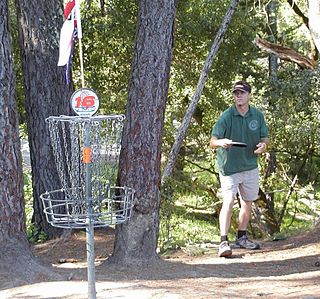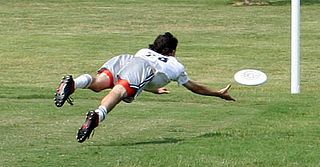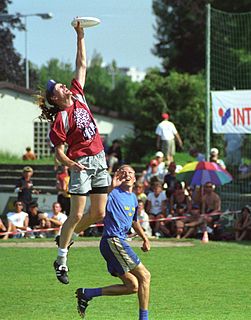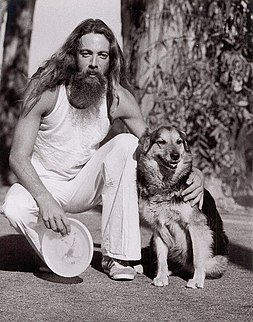
Disc golf, occasionally known as Frisbee Golf, is a flying disc sport in which players throw a disc at a target; it is played using rules similar to golf. Most disc golf discs are made out of polypropylene plastic, otherwise known as polypropene, which is a thermoplastic polymer resin used in a wide variety of applications. Discs are also made using a variety of other plastic types that are heated and molded into individual discs. The sport is usually played on a course with 9 or 18 holes (baskets). Players complete a hole by throwing a disc from a tee pad or area toward a target, known as a basket, throwing again from where the previous throw landed, until the basket is reached. The baskets are formed by wire with hanging chains above the basket, designed to catch the incoming discs, which then fall into the basket, for a score. Usually, the number of throws a player uses to reach each basket is tallied, and players seek to complete each hole in the lowest number of total throws. Par is the number of strokes an expert player is expected to make for a given hole or a group of holes.

A frisbee, also called a flying disc or simply a disc, is a gliding toy or sporting item that is generally made of injection-molded plastic and roughly 8 to 10 inches in diameter with a pronounced lip. It is used recreationally and competitively for throwing and catching, as in flying disc games. The shape of the disc is an airfoil in cross-section which allows it to fly by reducing the drag and increasing lift as it moves through the air, compared to a flat plate. Spinning the disc imparts a stabilizing gyroscopic force, allowing it to be both aimed with accuracy and thrown for distance.

Ultimate, originally known as ultimate Frisbee, is a non-contact team game played by players with a flying disc, flung by human. Ultimate was developed in 1968 by a group of students at Columbia High School in Maplewood, New Jersey. Although ultimate resembles many traditional sports in its athletic requirements, it is unlike most sports due to its focus on self-officiating, even at the highest levels of competition. The term Frisbee, often used to generically describe all flying discs, is a registered trademark of the Wham-O toy company, and thus the sport is not formally called "ultimate Frisbee", though this name is still in common casual use. Points are scored by passing the disc to a teammate in the opposing end zone. Other basic rules are that players must not take steps while holding the disc, and interceptions, incomplete passes, and passes out of bounds are turnovers. Rain, wind, or occasionally other adversities can make for a testing match with rapid turnovers, heightening the pressure of play.

Dodgeball is a team sport in which players on two teams try to throw balls and hit opponents, while avoiding being hit themselves. The objective of each team is to eliminate all members of the opposing team by hitting them with thrown balls, catching a ball thrown by an opponent, or inducing an opponent to commit a violation, such as stepping outside the court.

Disc dog is a dog sport. In disc dog competitions, dogs and their human flying disc throwers compete in events such as distance catching and somewhat choreographed freestyle catching. The sport celebrates the bond between handler and dog, by allowing them to work together. The term "disc" is preferred because "Frisbee" is a trademark for a brand of flying disc.

Beer die, beer dye or snappa is a table-based drinking game where opposing players sit or stand at opposite ends and throw a die over a certain height with the goal of either landing the die in their opponent's cup or having the die hit the table and bounce over the scoring area to the floor. The defending team attempts to catch the die one-handed after it hits the table, but before it touches a non-table surface. The game typically consists of two two-player teams with each of the four players having a designated cup on the table, but can also be played one-vs-one.

Flying disc freestyle, also known as freestyle Frisbee in reference to the trademarked brand name, is a sport and performing art characterized by creative, acrobatic, and athletic maneuvers with a flying disc. Freestyle is performed individually or more commonly in groups, both competitively and recreationally.

The World Flying Disc Federation (WFDF) is the international governing body for flying disc (Frisbee) sports, with responsibility for sanctioning world championship events, establishing uniform rules, setting of standards for and recording of world records. WFDF is a federation of member associations which represent flying disc sports and their athletes in 100 countries. WFDF is an international federation recognized by the International Olympic Committee (IOC), a member of the Association of IOC Recognised International Sports Federations (ARISF), GAISF, and the International World Games Association (IWGA), and it is a registered not-for-profit 501(c)(3) corporation in the state of Colorado, U.S.

Flying disc sports are sports or games played with discs, often called by the trademarked name Frisbees. Ultimate and disc golf are sports with substantial international followings.

Tom Monroe is a champion of virtually all flying disc sports, including ultimate, freestyle, field events and especially disc golf.

Polish Horseshoes is an outdoor game played between two teams of two people using a Frisbee, two glass bottles or cans, and stakes, ski poles or hiking sticks hammered into the ground. The game is played by the players taking turns throwing a Frisbee at a glass bottle that rests on top of the stakes in the ground. The two stakes are placed anywhere between 20 to 40 ft apart. Players must hold a drink in one hand at all times, leaving only one hand free for throwing and catching.

Super Dodgeball Brawlers, originally released in Japan as Chou Nekketsu Koko Kunio-kun Dodgeball Bu is a dodgeball-based sports game released for the Nintendo DS.

Baseball is a drinking game in which players shoot a ping-pong ball across a table with the intent of landing the ball in one of several cups of beer on the other end, doing so in a way combining beer pong and flip cup. The game typically consists of two teams of even numbers, one on each side of a table, and four cups set up on each side. The cups are lined up in a straight line representing the bases with the last cup at the edge of the table.
Prisonball is played much like the original dodgeball game, except when a player is hit, he gets put in "prison" behind the opposing team. To get out of prison, the player needs to receive a pass from a teammate while in the designated prison area. The way in which prisoners are released varies by region. "Prisoners" remain behind the opposing team until the game is over or they're released according to the current ruleset.

Kan Jam is a flying disc game, played with a flying disc and two cans into which players deflect the disc. Teams of two players take turns tossing a disc between two plastic cans, scoring points if the disc hits or is deflected into one of the cans. The game is played to a target score of exactly 21, but a team can also win if a player throws the disc through the slot or top of a can without the help of their teammate.

Ultimate Canada is a not-for-profit organization that serves as the governing body of the sport of Ultimate in Canada. It runs the Canadian Ultimate Championships (CUC) and Canadian University Ultimate Championship (CUUC) series.

Kenneth Ray Westerfield is a pioneering Frisbee disc player.

Catch, or playing catch, is one of the most basic children's games, often played between children or between a parent and child, wherein the participants throw a ball, beanbag, flying disc or similar object back and forth to each other. At early stages in a child's life, having a catch is a good way to evaluate and improve the child's physical coordination. Notably, "[i]f a child cannot catch a ball that he or she is bouncing, it is unlikely the child will be able to play catch". Most children begin to be able to play catch around the age of four. Many four-year-olds instinctively close their eyes when a ball is heading towards them, and it can take some time to overcome this. Playing catch can help develop dexterity, coordination and confidence.

Throwing sports, or throwing games, are physical, human competitions where the outcome is measured by a player's ability to throw an object.


















